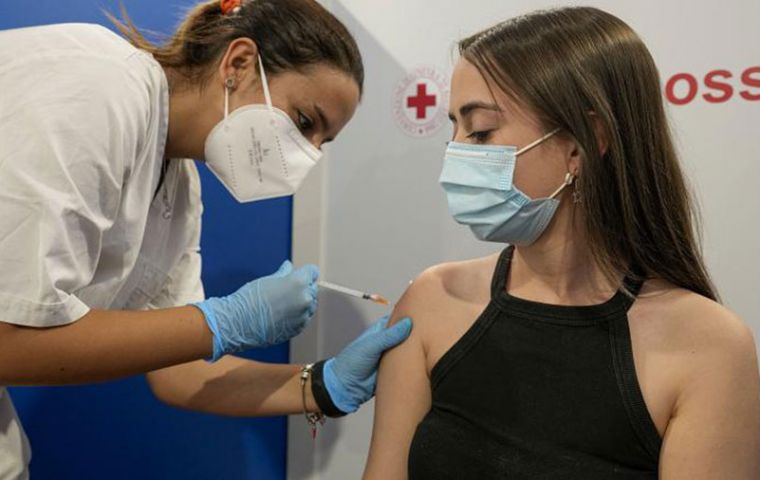MercoPress. South Atlantic News Agency
Brazil plans to start vaccinating youngsters aged 12 to 17 and reducing spell between Pfizer doses soon
 Brazil's health ministry currently recommends a 90-day gap between Pfizer shots, against the manufacturer's indication of 21 days.
Brazil's health ministry currently recommends a 90-day gap between Pfizer shots, against the manufacturer's indication of 21 days. Brazil's health authorities Tuesday announced vaccination of teenagers aged 12 to 17 years against Covid-19 will commence after the entire population aged 18 years and over has received at least one dose.
The announcement was made through a joint statement from Conass (the council of health secretaries at State -province- level) and Conasems (the one of health secretaries at municipal level), both managing bodies of the Unified Health System Health (SUS).
Conass Chairman Carlos Lula Tuesday also explained priority would be given teenagers with comorbidities. He also foresaw that completion of adult vaccination will be reached in between three to five weeks, so immunization of teenagers would be ready to start by late August or early Septermber, although it was not reported which brand would be used.
Pfizer's drug has been cleared for use on that age group since June and some Brazilian cities, such as Campo Grande, in Mato Grosso do Sul, Niterói, in Rio, and Guajará-Mirim, in Rondônia, have reportedly started to vaccinate teenagers. But Tuesday's statement specifies that local jurisdictions must comply with the National Immunization Plan, “under penalty of future liability.”
Around 46% of Brazil's population had received at least one dose of anticoronavirus vaccine by Tuesday, while more than 18% of is fully immunized, either with two doses or with a single-dose drugs against Covid-19.
Along the same lines came Health Minister Marcelo Queiroga's statement Tuesday said that the reduction of the interval between doses of Pfizer's vaccine should only occur after vaccinating the entire population over 18 years old with at least one of the immunizing agents available in the country.
The ministry currently recommends a 90-day gap between the first and second shot of Pfizer, while the drug's package clearly specifies it should be of 21 days.
“After we reach the population over 18 years old, all vaccinated with the first dose of the vaccine. After, there [comes] the strategy of reducing the dose range of the immunizing agent, which has scientific evidence for this reduction, which is the Pfizer vaccine, approved at Anvisa,” the minister told journalists in a joint press conference with Carlos Lula.
Brazil's Special Secretary for the Fight Against Covid-19 Rosana Leite also explained that “at Pfizer, the [gap] that is on the package insert is 21 days.” She added that local authorities allowed for a longer spell between shots in order to advance with the first dose, but as Pfizer's vaccines were now arriving in large volumes, it would be possible to review this strategy.
“We have already carried out several analyzes and, with the deliveries that we have, it is possible to go back to the deadline that is in the brochure,” Queiroga admitted. But only after the the 1st dose has reached all adults, he added.
Meanwhile, Brazil's National Health Surveillance Agency (Anvisa) has suspended on a temporary basis the authorization for the importof the Indian-developed Covaxin immunizer after the Indian laboratory Bharat Biotech stated that the company Precisa Medicamentos does not have authorization to represent it in Brazil.
“The decision also took into account the news that illegitimate documents could have been attached to the import process, which may affect the conclusions about the quality, safety and efficacy aspects of the vaccine that will be used in the national population.”
Bharat Biotech announced on July 23 that it ended the memorandum of understanding to sell Covaxin to Precisa Medicamentos. In the note, the Indian company “vehemently” denied having issued documents presented by that Brazilian company to the Health Ministry during the drug acquisition process.
The aforementioned documentation is part of the contract signed on February 25 between the ministry and the manufacturer. Brazil even committed billions of reais for the acquisition of 20 million doses of overpriced Covaxin, but the purchase was halted as a scandal broke out. The case is now under investigation by the Senate commission that evaluates the government's management of the pandemic, the Federal Police, the Federal Prosecutor's Office and the Union Court of Accounts.




Top Comments
Disclaimer & comment rulesCommenting for this story is now closed.
If you have a Facebook account, become a fan and comment on our Facebook Page!